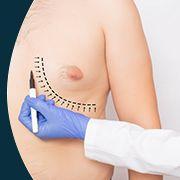Gynecomastia: Comprehensive Guide On Symptoms, Diagnosis, and Treatment
In This Article
Gynecomastia: Comprehensive Guide On Symptoms, Diagnosis, and Treatment
Jaymala
Updated on February 06, 2024
Medically verified by Dr. Arya
Fact checked by Dr. Pournami

Cosmetic
4 min read
Are you someone with manboobs? Do these enlarged breasts force you to hide away from society?
This condition is called gynecomastia. It is a condition that involves the enlargement of breast tissue in males. Though the condition normally does not need any medical intervention in some cases it may require surgery.
This can have physical as well as psychological impacts on a person’s well-being. But no need to panic, we have the solution for it.
Mykare Health is here to provide a complete guide about this condition and ways to manage, cope or deal with it with confidence and find out ways to prevent and eliminate it.
Symptoms Of Gynecomastia
First thing first, let’s identify the signs of gynecomastia.
-
The breast tissues appear tender than the surrounding area.
-
Breasts are sensitive - can range from mild to more pronounced.
-
There may be asymmetry in both the breasts.
Diagnosis
Care to know how to diagnose gynecomastia? Here it is:
-
A detailed medical history, any associated symptoms, medications taken, existing medical conditions, and family history may be needed.
-
An examination to assess breast enlargement is taken.
-
The healthcare provider will also examine the testicles, as certain conditions affecting the testes can contribute to gynecomastia.
-
Blood tests may be ordered to measure hormone levels. Gynecomastia is often caused by imbalance in these hormones.
-
Ultrasound or mammography may be performed to evaluate the breast tissue.
Causes of Gynecomastia
Let's find out the causes of this condition:
-
Changes in the balance between estrogen and testosterone during different life stages, can lead to gynecomastia.
-
Certain medications can cause gynecomastia as a side effect, such as Tricyclic antidepressants, Medications used in the treatment of HIV.
-
Various medical conditions may contribute to gynecomastia, such as Malnutrition.
-
Certain lifestyle choices and environmental factors may play a role.
-
Overweight or obese individuals can contribute to the appearance of gynecomastia.
 9 min read
9 min readThe Advantages of Choosing Mykare Health for Gynecomastia Surgery
 6 min read
6 min readIdentifying The Ideal Age For Gynecomastia Surgery
 6 min read
6 min readPre and Post Gynecomastia Surgery: Essential Things to Know
Book Your Consultation Now
Treatment Options
In some cases treatment may not be required. But in other cases even surgery may be needed. So it is necessary to evaluate the cause and proceed accordingly.
Hormone-modulating medications may be prescribed to address gynecomastia caused by hormonal imbalances.
Some of the surgical procedures that you may need to undergo are:
Mastectomy: Also known as male breast reduction surgery, this involves the removal of excess breast tissue. Liposuction may be used in addition with surgery to remove excess fat.
Liposuction: This procedure removes excess fat.
Psychological Impact And Counseling
Such conditions may affect you physically and mentally both, so it is essential to communicate and seek help.
-
Gynecomastia may lead to feelings about one's appearance and may affect one’s life in various aspects.
-
Changes in breast appearance may impact an individual's perception of their body image. This can lead to negative self-perception.
-
Individuals with gynecomastia may experience challenges in social and peer relationships, fear of teasing from peers can contribute to social withdrawal.
-
Gynecomastia may affect an individual's comfort and confidence in intimate relationships.
-
Psychological counseling can be beneficial. Counseling can provide a safe space to express feelings, and enhance self-esteem.
-
Support groups, either in-person or online, can connect individuals with others experiencing similar challenges.
-
Proper education and information can contribute to a clear perspective and reduce anxiety.
Prevention And Lifestyle Tips
Overweight is often linked with an increased risk of gynecomastia.
-
Adopt a healthy diet and exercise regularly to maintain healthy weight and reduce excessive fat.
-
Include cardiovascular exercises and strength training exercises in your everyday workout routine and follow it sincerely.
-
Limit or avoid alcohol consumption which can contribute to overall health and well-being.
-
Keep a check on your medications and their side effects.
-
Regular health check-ups can help identify and address hormonal imbalances early.
Considerations For Special Populations
Gynecomastia is common during puberty due to hormonal changes, if it continues or causes emotional distress, medical evaluation is advisable.
Hormonal changes associated with aging, along with other factors, can contribute to gynecomastia in older men.
Some bodybuilders may develop this condition due to usage of steroids. Liver disease or kidney failure, may also contribute to gynecomastia.
What Are The Complications And Risks Of Gynecomastia?
Gynecomastia can lead to emotional distress, anxiety, and depression affecting the individual self esteem. Here’s what you should be mindful of:
-
The psychological impact may contribute to social withdrawal and difficulties in personal relationships.
-
It can result in negative body image perceptions, potentially impacting an individual's confidence and self-perception.
-
It can be a symptom of any medical conditions, such as hormonal imbalances.
-
Some medications associated with gynecomastia as a side effect may have additional adverse effects on other organ systems.
Gynecomastia is a condition which involves the enlargement of breast tissue in males.
Common symptoms include breast enlargement, and tenderness.
Gynecomastia can be caused by hormonal imbalances, or by certain medications, or any health conditions.
Diagnosis includes a complete medical history, physical examination, hormone level testing,and imaging studies.
Treatment depends on the cause and may include a surgery, and lifestyle changes.
Gynecomastia can have a significant psychological impact, leading to emotional distress, thus challenging social relationships.
Psychological counseling and support groups can help individuals cope with the emotional aspects of gynecomastia.
Maintaining a healthy weight, and regular exercise in any form such as yoga, cycling, jogging, running or brisk walking, can contribute to overall well-being.
Different populations, such as adolescents, older men, bodybuilders, may have different symptoms regarding gynecomastia.
Psychological impact, delayed diagnosis of underlying conditions, side effects of medications, and the risks associated with surgery may be the complications during the treatment.
People having gynecomastia symptoms should seek medical advice.



